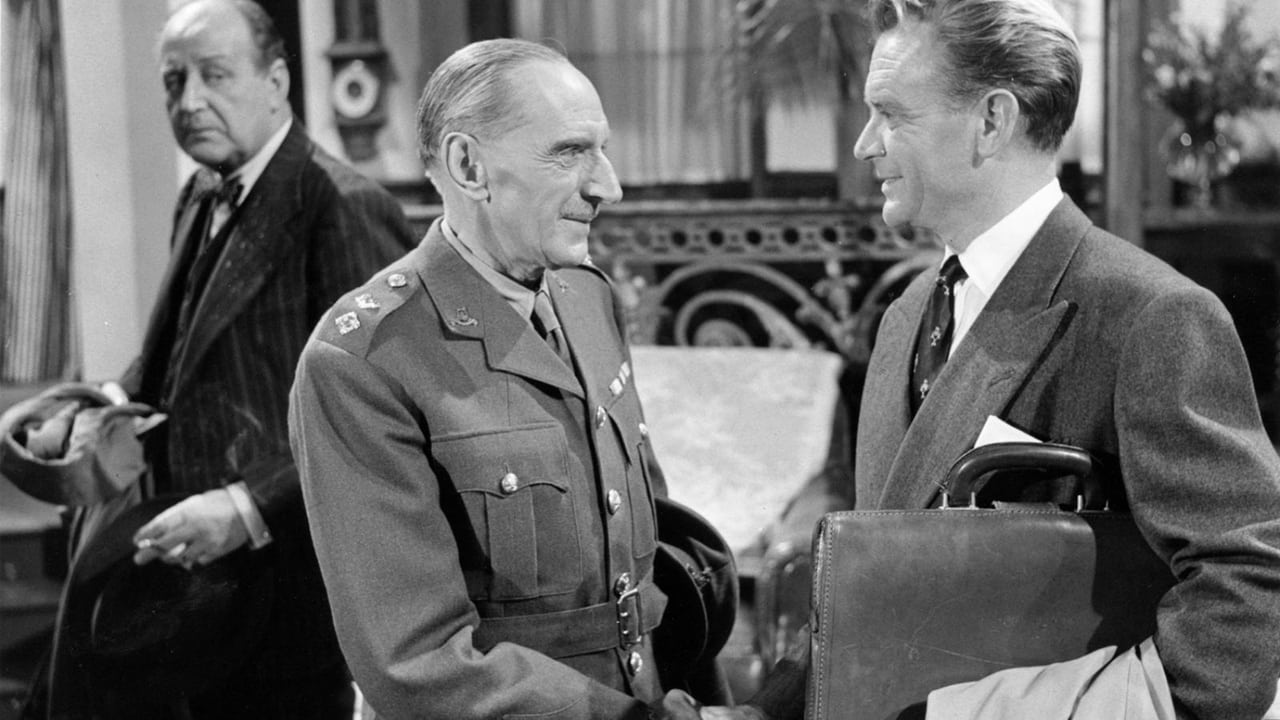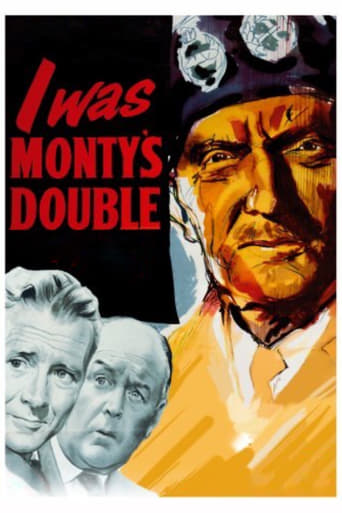MoPoshy
Absolutely brilliant
FuzzyTagz
If the ambition is to provide two hours of instantly forgettable, popcorn-munching escapism, it succeeds.
Teddie Blake
The movie turns out to be a little better than the average. Starting from a romantic formula often seen in the cinema, it ends in the most predictable (and somewhat bland) way.
Roxie
The thing I enjoyed most about the film is the fact that it doesn't shy away from being a super-sized-cliche;
bkoganbing
With some considerable dramatic license the story of one of the best intelligence operations of World War II is told in I Was Monty's Double. The film is based on the book by actor F.E. Clifton James who plays himself and Bernard Law Montgomery as he did for a fateful few weeks in World War II.John Mills and Cecil Parker two officers from British Intelligence become James's handlers in the terminology we would use today. Mills while attending a service variety show sees James do a walk on as Field Marshal Montgomery and is struck by the audience reaction to him. The germ of an idea comes to Mills to have the actor play Montgomery for the widest audience possible, to give him a grand tour of the various fronts of the war. This in order to divert Nazi attention from the United Kingdom where the cross channel invasion is being prepared and Montgomery very much a part of the planning. In fact you can see some of his real role there in the TV mini-series Ike and in The Longest Day.Of course James carried the masquerade off beautifully. My favorite scene is James at a press conference in Cairo with allied war correspondents where he's at first hesitant with this cynical bunch, but grows in confidence and wins them over with a speech that you might have seen the real Bernard Law Montgomery deliver during his lifetime.Two others who give noteworthy performances in the film are Michael Hordern as the Governor General of Gibraltar and Marius Goring who is a German agent whom Mills, Parker and James deliberately give misinformation to in order to confirm how effective the plan is working.The whole business in the end is pure fiction which I won't reveal, but that doesn't detract from making this a first rate account of an amazing adventure. One even Stephen Spielberg would envy.
Robert J. Maxwell
This is the somewhat true story of Lt. Clifton James who impersonated Gen. Bernard Montgomery at various Allied bases in order to mislead the Germans into thinking that the D-Day invasions would take place somewhere in the Mediterranean.James is pretty convincing too. If he's not a bravura actor, he is at least an actor, which he was in civilian life. He's ably assisted by John Mills, who guides him through his various performances on stage and off, and by Cecil Parker, who is more or less in charge of all the fakery.The British are extremely good at this kind of deceit. I mean, here they have the huevos to pass off some second-rate vaudevillian as a British field marshal and parade him around the high brass, both British and American, in Gibralter and North Africa. Then, too, there was "The Man Who Never Was," a carefully prepared scheme designed to persuade the Germans that the Allies would invade the Balkans rather than Sicily. Outrageous. I don't know who thought up putting General George Patton in charge of the fake FUSAG before Normany, with its inflatable rubber tanks and trucks and its wooden airplanes and concocted radio transmissions but I suspect that if Sherlock Holmes were to investigate he'd be able to sniff out the residual odor of fish and chips. Even during the Falkland Islands war, in 1982, just after the invasion by Argentine troops, the British were entirely candid about the ships and airplanes that were lost, but they'd immediately announced a blockade of the islands, maintained by British submarines -- that were not there. The lesson to be learned from these tricks is that the deceit must be plausible, infrequent, and strategic. Americans seem to do it differently. They lie recklessly. If an American sports figure dies in combat, he's given a decoration even if the death was the result of friendly fire. If a beautiful young woman is rescued from her Iraqi captors, she must have fought heroically and been abused before her salvation.Wait. Someone is flapping a napkin at me from the other end of the table. Let me get back to the movie.This is more of a comedy with some tense moments than it is a war-time drama. With Cecil Parker in a prominent role it could hardly be a heavy movie. Mills is his usual competent self, playing an officer with an eye for the girls. There's one scene that always cracks me up. A gorgeous blond secretary enters the room preceded by her bouncing breasts. She's holding a few pages in front of her. Mills' hand darts out towards her chest and just for a moment -- But, no. He grabs the sheets of paper and yanks them away. Nothing is made of it and the incident only last a second or two but it's emblematic of the movie.Except for the climactic scene in which German raiders capture James, still thinking he's Montgomery, and try to pirate him away from his seaside base until they are foiled by Mills wielding a single Sten gun. Man, that's not only improbable. It's practically impossible. And in fact it never happened.The direction is by John Guillerman, who has had his ups and his downs. One of his ups, in which I had the good fortune to appear, was the serene and majestic art house hit, "King Kong Lives." Here, sadly, his technique is pedestrian. Each important statement is filmed in close up. (That's so the statement's importance doesn't slip past you.) And some scenes are clumsily staged. However, I forgive him any of that because of the way he handled that breasts/papers incident.I don't know if I'd want to watch this too often. We all appreciate Clifton James and his accomplishments but he's not a strong figure and the responsibility of carrying the film is largely his, although the script sticks with Mills and Parker as much as it can.Still, enjoyable, exciting, and -- for some younger folk, I'm afraid -- highly educational.
Terrell-4
As improbable as it seems, Hitler sent a panzer division and 50,000 troops to the south of France just before the Normandy invasion. Hitler did it because he was so impressed by the performance of a second-string actor who up to May, 1944, was most proud of his lead role as Charley's Aunt in British regional rep. In this case, however, M. E. Clifton-James was playing Bernard Montgomery. Clifton-James bore an uncanny resemblance to the field marshall. When MI5 realized this, they organized one of the great WWII cons. Up until then, Clifton-James had been a middle-aged, low-ranking officer, in for the duration, who'd wound up in the Royal Army Pay Corps. He was pulled out of that, assigned for a few days to Montgomery's staff posing as an enlisted man so he could secretly study Montgomery's mannerisms and style, then sent as Montgomery first to Gibraltar and then to North Africa. Once there, posing as the field marshall, he attended high-level meetings, reviewed the troops, gave inspiring speeches...and all the while MI5 was insuring that his "secret" visits were being leaked to German intelligence. Would the Germans take the bait and believe Monty was prepping the field for a major landing at the underbelly of Europe? MI5 and Clifton-James had their answer when German fighters attacked the transport carrying the false Monty to another North African location. Then German commandos arriving by sub managed to kidnap "Montgomery" and move him to the beach before British soldiers (in the movie, two good-looking officers, one played by John Mills) daringly rescue the actor, who by now had fainted. All true? Well, supposedly, most of it. I'd take the kidnapping and the rescue with a grain of salt. Clifton-James after the war wrote his auto-biography titled "I Was Monty's Double" and it sold briskly. He was 46 during the seven weeks of his training and impersonation. MI5 kept him in seclusion in Cairo until after the Normandy invasion, then returned him to duty in England in the Pay Corps. He probably never had a better role, and certainly never a more important one, in his life. He was 60 when the movie was made and died five years later. He carries off playing himself very well. He holds his own with John Mills as the fictional Major Harvey and Cecil Parker as the fictional Colonel Logan. Parker runs the scam; Mills makes sure Clifton-James doesn't lose his nerve and stays with him during training and in North Africa. This being a sort-of Mills war movie, Mills is cheery, competent and loaded with upper-class confidence, either when trying to rekindle an old love while on leave or gunning down a large group of tough German commandos. The tone of the movie, with a screenplay by Bryan Forbes, is one of British insouciance, the undertaking of deadly serious actions with under-played bravery and deprecating humor. Some of the humor comes from cracks made by Mills as Major Harvey about actors' vanity. The last 20 minutes of the movie turns into a more standard war story with a midnight beach landing, silent knifings, an attack in the waves and bullets flying on the beach. The movie regains its footing of good cheer at the close. I Was Monty's Double may not be an unknown war classic, but it's a well-made, well-scripted and well-acted movie. M. E. Clifton-James turns out to be a sympathetic and even endearing person, something that would never be said about Montgomery.
hedgehog-10
It helped in this film to have the actual person that really did impersonate Montgomery. Clifton James give a good performance as both himself and Montgomery. An excellent Bryan Forbes script that is well delivered by Cecil Parker and John Mills.

